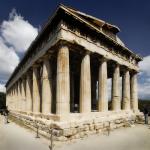|
This section contains 761 words (approx. 3 pages at 300 words per page) |

|
The Outsiders. To many Greeks, Macedon was not part of the Greek world. Most of the Macedonians did not speak Greek, and their social organization was closer to that of the Homeric world, with its hereditary kingships and clan chiefs, than it was to the contemporary world of the Greek polis. Macedon was an area rich in timber and metals. As far as the Greeks were concerned, its people simply provided a buffer between themselves and the even less civilized people who lived beyond Macedon. However, a Macedonian, Philip II, organized a formidable army that not only conquered the Greek city-states but also represented one of the most powerful military machines in Western society before the advent of firearms.
War Machine. As a young boy, Philip of Macedon lived in Thebes and observed how military power functioned. He...
|
This section contains 761 words (approx. 3 pages at 300 words per page) |

|




